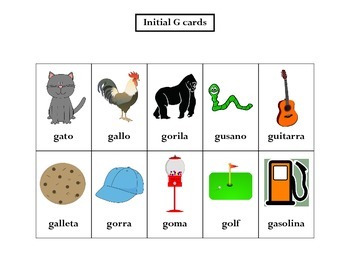Words That Start With G In Spanish
1. Gato (cat)
2. Grande (big)
3. Gente (people)
4. Goma (rubber)
5. Gracias (thank you)
6. Guante (glove)
7. Globo (balloon)
8. Gemelo (twin)
9. Gusto (taste)
10. Gira (tour)
11. Gorra (hat)
12. Gráfico (graphic)
13. Gitano (gypsy)
14. Gruñir (to growl)
15. Golpear (to hit)
16. Galleta (cookie)
17. Garaje (garage)
18. Girasol (sunflower)
19. Garza (heron)
20. Granito (granite)
21. Guinda (cherry)
22. Guión (script)
23. Guardar (to save)
24. Gallo (rooster)
25. Garrapata (tick)
26. Guardia (guard)
27. Gato montés (wildcat)
28. Güiro (gourd scraper)
29. Grúa (crane)
30. Golosina (sweets)
More About
Welcome to the fascinating world of Spanish words that start with the letter “G”! Spanish, as you may already know, is a rich and vibrant language with a diverse vocabulary. Exploring words that begin with “G” allows us to uncover a plethora of unique and interesting terms that evoke cultural significance and linguistic beauty.
The Spanish language, spoken by millions around the globe, offers a wide array of words that start with the letter “G.” From everyday vocabulary to specialized terminology, each word carries its own story and meaning. Whether you are a language enthusiast, a student, or simply curious about expanding your knowledge, this exploration of “G” words in Spanish will surely captivate your interest.
One of the many wonderful aspects of Spanish is its connection to diverse cultures and traditions. Just as Spanish-speaking countries boast a rich tapestry of history and heritage, so does their vocabulary. By delving into words that begin with “G,” we embark on a journey through Hispanic culture and its colorful expressions. These words allow us to grasp a deeper sense of the Hispanic way of life, showcasing their unique customs, beliefs, and values.
The letter “G” encompasses an eclectic mix of words, some of which you may already be familiar with. For instance, “gato” means “cat” in Spanish, a word that shares its etymology with many other Romance languages. However, beyond the more obvious terms, there are countless hidden treasures awaiting discovery. From gastronomy to geography, fashion to folklore, the world of “G” words continuously surprises and delights.
For those who love culinary adventures, Spanish cuisine is a true haven. The letter “G” introduces us to an assortment of mouth-watering delights that exemplify the centrality of food and hospitality in Hispanic culture. Picture yourself savoring a delicious “gazpacho,” a chilled tomato-based soup perfect for hot summer days, or indulging in a plate of succulent “gambas al ajillo,” garlic-infused shrimp that form an integral part of Spanish tapas.
Beyond the realm of gastronomy, the letter “G” opens up a world of natural wonders. Spanish boasts an extensive vocabulary to describe the diverse landscapes found in Spanish-speaking countries. Think of the breathtaking “glaciares” (glaciers) in Patagonia, Argentina, or the mystical “geisers” (geysers) of El Tatio in Chile. These words transport us to the far corners of the earth, allowing our imagination to soar and our knowledge to expand.
As we explore further, we uncover linguistic gems that express human emotions and experiences. For example, “gracias” (thank you) is a word known worldwide, showcasing the importance of gratitude in Spanish culture. The concept of “ganas” refers to a strong desire or motivation to achieve something, emphasizing the determination and passion often associated with Spanish-speaking communities. These words connect us on a deeper level with the Spanish language and its ability to capture the intricacies of the human spirit.
Whether you are an enthusiast learning the language, a traveler planning your next adventure, or simply someone interested in broadening your horizons, this exploration of Spanish words that start with “G” promises to be an exciting and enriching experience. From the vibrant expressions of Hispanic culture to the natural wonders that dot the landscape, each word presents an opportunity to gain insight into the vast and captivating world that Spanish encapsulates.
Join us as we embark on this linguistic journey and uncover the beauty and charm of Spanish words that begin with “G.” Discover the cultural richness, indulge in the culinary delights, and immerse yourself in the captivating narratives that these words present. Whether you are looking to expand your vocabulary or ignite a passion for exploration, this exploration is sure to leave you spellbound. Stay tuned for our upcoming articles, as we delve deeper into the world of “G” words in Spanish. ¡En marcha!
FAQs:
1. ¿Qué significa “guitarra” en español?
– “Guitarra” significa un instrumento musical de cuerda pulsada.
2. ¿Cuántas palabras en español comienzan con la letra “g”?
– Hay muchas palabras en español que comienzan con la letra “g”. Algunos ejemplos son: gato, gracias, gente, guerra, galleta, etc.
3. ¿Qué es una “gripe” en español?
– Una “gripe” es una enfermedad viral que afecta las vías respiratorias superiores.
4. ¿Cuál es la capital de Guatemala?
– La capital de Guatemala es Ciudad de Guatemala.
5. ¿Qué es un “globo” en español?
– Un “globo” puede referirse a un objeto inflable y flotante, o también puede ser una forma de referirse a un país en el ámbito político.
6. ¿Cuál es la traducción de “gracias” en inglés?
– La traducción de “gracias” en inglés es “thank you”.
7. ¿Qué es un “grifo” en español?
– Un “grifo” puede referirse a un mecanismo utilizado para controlar el flujo de agua, o también puede ser una palabra coloquial para referirse a una persona que consume alcohol en exceso.
8. ¿Cuál es la traducción de “gafas” en inglés?
– La traducción de “gafas” en inglés es “glasses”.
9. ¿Puede mencionar un plato típico español que comienza con la letra “g”?
– Un plato típico español que comienza con la letra “g” es la “gazpacho”, una sopa fría hecha de tomate, pepino, pimiento y otros ingredientes.
10. ¿Qué significa “guapo” en español?
– “Guapo” puede tener varios significados en español. Puede referirse a una persona atractiva físicamente, pero también se utiliza para expresar que algo es bueno o genial.
















